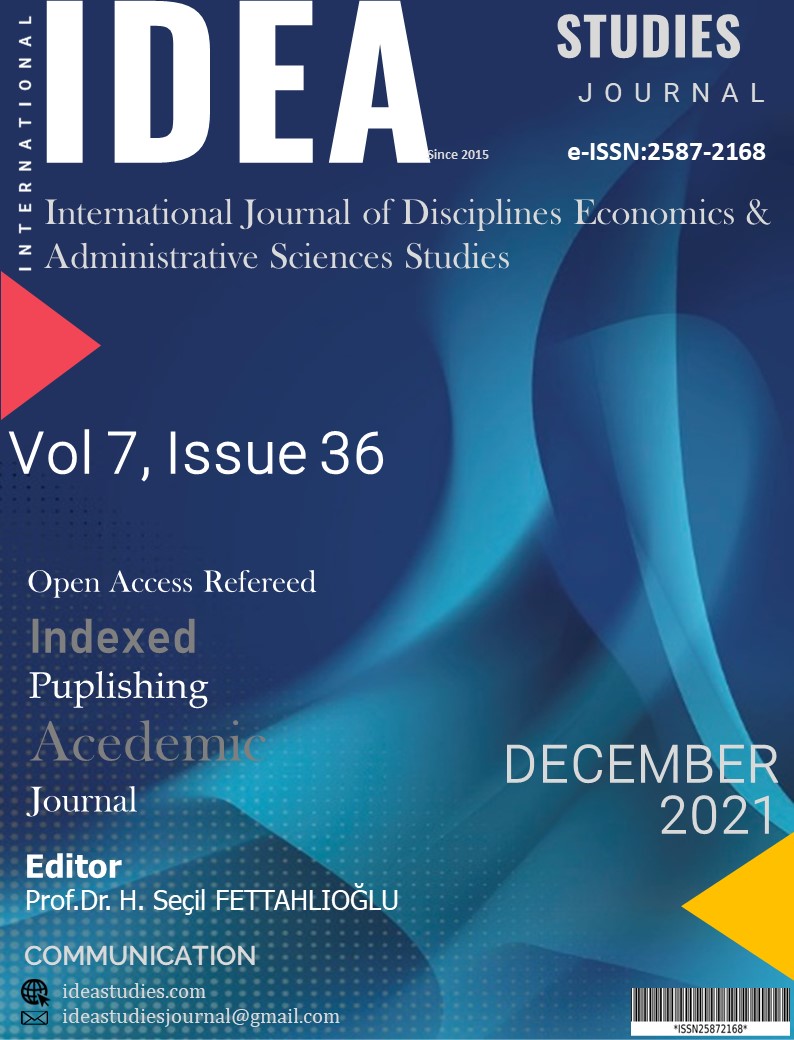ORTAÖĞRETİM KURUMLARINDAKİ YÖNETİCİLERİN KRİZ YÖNETİMİNDEKİ YETERLİLİKLERİNİN BELİRLENMESİ (ARTVİN İLİ ÖRNEĞİ)
Author :
Abstract
Bu araştırmanın amacı, ortaöğretim kurumu yöneticilerinin yönetim fonksiyonlarını yerine getirirken hangi krizlerle karşılaştıklarını, kriz yönetim bilgilerini, okulda ortaya çıkan krizleri hangi faktörlerin tetikleyeceğini, kriz yönetim süreci algılarının kişisel değişkenlere (cinsiyet, yaş, meslek ve yöneticilikteki kıdemi, hizmet içi eğitim vb.) göre nasıl değişiklikler gösterdiğini, yöneticilerin kriz yönetimi çalışmalarının neler olduğunu ve kriz yönetimi sürecinde kimlerden yardım alabileceklerini belirlemektir. Bu çalışmada betimsel modelinden yararlanılmıştır. Araştırmada veri toplama aracı olarak “Kriz Yönetimi Ölçeği” kullanılmıştır. Araştırmanın evreni 2020-2021 eğitim öğretim yılı Artvin Merkez ve ilçelerindeki 32 ortaöğretim kurumları yöneticilerinden oluşmaktadır. Araştırmanın örneklemini oluşturan 48 yöneticinin 38’i erkek, 10’u kadın, yine bu yöneticilerin 19’u müdür, 1’i müdür başyardımcısı ve 28’i müdür yardımcısıdır. Verilerin değerlendirilmesinde SPSS 25.0 sürümü kullanılmıştır. Kriz yönetimi ölçeği uygulama sonuçlarına göre yöneticilerin kriz yönetimi sürecindeki yeterlilikleri öğretmenlikteki ve yöneticilikteki kıdem, yaş, okuldaki pozisyonu ve hizmet içi eğitimlerine katılımlarına bağlı olarak değiştiğini göstermesine rağmen, bu farkın istatistiksel olarak anlamlı bir fark yaratacak büyüklükte olmadığı belirlenmiştir.
Keywords
Abstract
The aim of this research is to determine that what crises the secondary school administrators are facing while performing their management functions, their crises management knowledge, what factors will trigger crises that occur at school, how crises management process perceptions change according to personal variables (gender, age, occupation and seniority in management, in – service training, etc.), what the crises management activities of managers are and from whom they can help during the crises management process.Survey method was used in this descriptive study. “Crises Management Scale” was used as a data collection tool in the research. The population of the research consisted of 32 the secondary school administrators working in the central and districts of Artvin in 2020 – 2021 academic years. 38 of the 48 administrators who constitute the sample of the research are male and 10 are female, furthermore, 19 of these administrators are managers, 1 is the head assistant manager and 28 of them are assistant managers. SPSS (Statistical Package for Social Sciences) 25.0 version was used in the evaluation of data. According to the results of the crises management scale implementation, although administrators’ sufficiency during the crises management process differs according to seniority in teaching and administration, age, position at school, their participation in in – service training, t is isentidied that this isn’t big enough to make a statiatically significant difference.
Keywords
- Aydemir, M., & Demirci, M. K. (2005). Son dönemlerde yaşanan krizlerin işletmeler üzerindeki olumlu
- Aydemir, M., & Demirci, M. K. (2005). Son dönemlerde yaşanan krizlerin işletmeler üzerindeki olumlu etkilerinin analizi. Cumhuriyet Üniversitesi Sosyal Bilimler Dergisi, 29(1), 65-81.
- Bakioğlu, A. & Savaş, C. (2001). Okulda Depremin Neden Olduğu Krizin Yönetimi . Öneri Dergisi , 4 (15) , 25-30 . DOI: 10.14783/maruoneri.735484
- Bozgeyik, A. (2004). Krizleri fırsata dönüştürmek. İstanbul: Hayat Yayıncılık. Can, H. (1997). Organizasyon ve yönetim. Ankara: Siyasal Kitabevi.
- Çelikten, M. (2001). Okul yöneticilerinin problem çözme becerileri. Kuram ve.Dönmez, B. (2001). Okul güvenliği sorunu ve okul yöneticisini rolü. Kuram ve.
- Karasar, N. (1998). Bilimsel araştırma yöntemi (8. baskı). Ankara: Nobel Yayın.
- Sayın, N. (2008). Ortaöğretim kurumlarında kriz yönetimi stratejisinin incelenmesi (İstanbul il örneği), Yayımlanmamış doktora tezi, Marmara Üniversitesi Eğitim Bilimleri Enstitüsü, İstanbul.
- Tutar, H. (2004). Kriz ve stres yönetimi. Ankara: Seçkin Yayıncılık.





